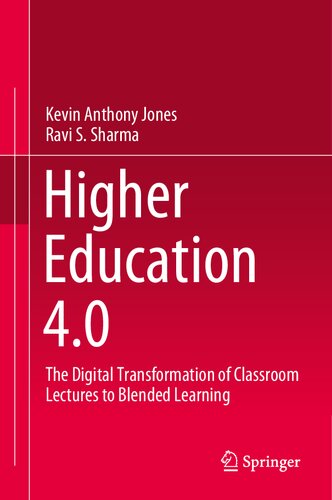

Most ebook files are in PDF format, so you can easily read them using various software such as Foxit Reader or directly on the Google Chrome browser.
Some ebook files are released by publishers in other formats such as .awz, .mobi, .epub, .fb2, etc. You may need to install specific software to read these formats on mobile/PC, such as Calibre.
Please read the tutorial at this link. https://ebooknice.com/page/post?id=faq
We offer FREE conversion to the popular formats you request; however, this may take some time. Therefore, right after payment, please email us, and we will try to provide the service as quickly as possible.
For some exceptional file formats or broken links (if any), please refrain from opening any disputes. Instead, email us first, and we will try to assist within a maximum of 6 hours.
EbookNice Team

Status:
Available0.0
0 reviewsThis book chronicles a 10-year introduction of blended learning into the delivery at a leading technological university, with a longstanding tradition of technology-enabled teaching and learning, and state-of-the-art infrastructure. Hence, both teachers and students were familiar with the idea of online courses. Despite this, the longitudinal experiment did not proceed as expected. Though few technical problems, it required behavioural changes from teachers and learners, thus unearthing a host of socio-technical issues, challenges, and conundrums.
With the undercurrent of design ideals such as “tech for good”, any industrial sector must examine whether digital platforms are credible substitutes or at best complementary. In this era of Industry 4.0, higher education, like any other industry, should not be about the creative destruction of what we value in universities, but their digital transformation. The book concludes with an agenda for large, repeatable Randomised Controlled Trials (RCTs) to validate digital platforms that could fulfil the aspirations of the key stakeholder groups – students, faculty, and regulators as well as delving into the role of Massive Open Online Courses (MOOCs) as surrogates for “fees-free” higher education and whether the design of such a HiEd 4.0 platform is even a credible proposition.
Specifically, the book examines the data-driven evidence within a design-based research methodology to present outcomes of two alternative instructional designs evaluated – traditional lecturing and blended learning. Based on the research findings and statistical analysis, it concludes that the inexorable shift to online delivery of education must be guided by informed educational management and innovation.